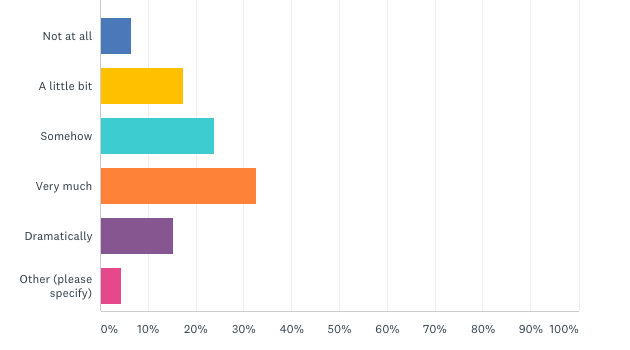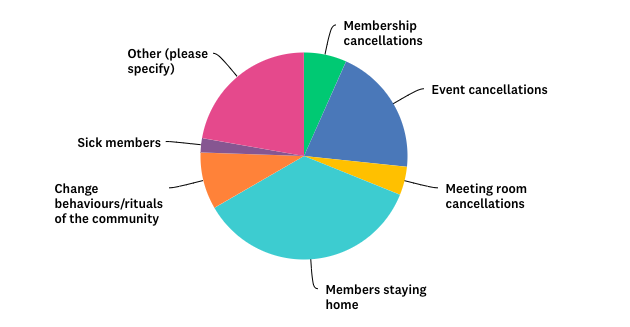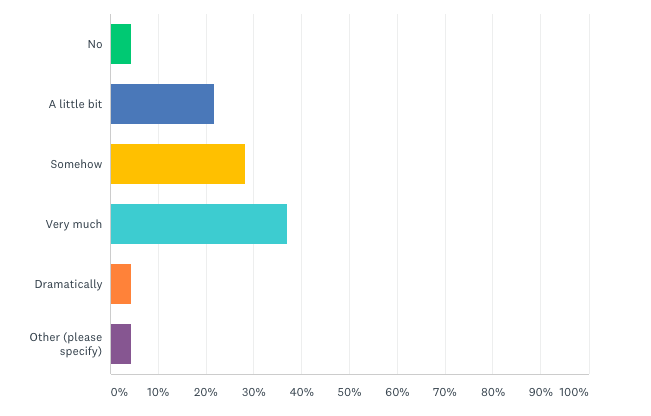The recent outbreak of COVID-19 is affecting everyone’s lives; the coworking industry is no exemption. In order to offer some support to all the coworking community, we created and shared a survey to find out and gather the best coworking practices on the measures put in place to weather the storm.
Close to 50 coworking space operators answered the survey initiated by SocialWorkplaces.com, between March 13th and March 16th. Here are the feedbacks we received from all over the world (Europe, US, Australia, China, India). We all are together in this; we feel your pain and we hope this can be helpful and bring some light at the end of the tunnel.
The Coworking industry is strongly impacted by the coronavirus outbreak
By March 19th, the coronavirus pandemic already had a big impact on the coworking sector. 47% of coworking spaces around Europe answered that they are very much or even dramatically affected; 24% state that they are somehow affected, 18% a little bit affected while others. Only 7% of the respondents maintain that Covid-19 hasn’t impacted their daily businesses at all.

Question: How much is your coworking space impacted by the coronavirus pandemic as we speak?
Event cancellations have hit the business at first, followed by a drop in users presence
34% of the respondents affirm that the biggest impact they have seen in their coworking space is that members are staying home instead of going to their workplace as usual. 20% declare that cancelled events have most affected their business. 9% of the participants mention the change of attitude and behaviour of their members and how the coronavirus outbreak has affected the routines and rituals of their members. Meeting room and membership cancellations have been less of a problem so far.

Question: What is the biggest impact you have suffered so far?
Decrease available seats, sanitizers on every table, namaste instead of handshake…
In order to create a safe work environment there are specific preventive measures that coworking spaces are implementing. We have compiled most of the ideas and best practices from our responses below (*). Some of them are common sense, others pure hygiene procedures while others might surprise or inspire you.
- Hand sanitiser / alcohol gel at the entrance for every member to use when entering and leaving the space
- Tissues, antiseptic wipes, sanitisers… available for all members at the host area / cafè area / common area… and/or on each table
- Train coworking staff on hygiene practices, implement cleaning protocols & new hygiene procedures (i.e clean things like door handles, taps, light switches…)
- Mandatory use of disinfectants & other sanitary products by all delivery personnel, postmen, etc.
- Leaving windows and balconies open for fresh air and circulation
- Provision of paper towels rather than reusable towels for the time being
- No physical contact. Namaste instead of handshake and keeping 2 meters distance between members
- Information emails and/or use of digital channels and/or offline posters with educational hygiene behaviours and WHO guidelines for the community
- Digital thermometer station: “Are you suffering any of these symptoms? Please, take your temperature”
- Travel declaration form for all members and their visitors as well as ask members to report any symptoms
- Suspension of day passes, meeting room reservations and events
- Cancelation of all community events and close of all meeting rooms
- Moving community learning events and discussions online
- Suggest people to work remotely for at least 2 weeks
- Decrease available seats in order to increase distance between members
- Close all operations and suspend all activities until further notice; remain closed
- Allow people to take home furniture from the coworking to be able to work from home
(*) Questions were answered a few days ago. Things are moving very fast and some spaces have temporarily shut down in the meantime.
Coworking members fear to get infected in the workspace or while commuting
Coworking spaces care about their members, their health and well-being. For the past weeks, coworking space owners and employees have been witnessing their members having two main fears in the presence of this sudden outbreak of the coronavirus.
First main fear is being infected by Covid-19 and its health effects. Worries go from:
- Using communal areas that one shares with people whose travel history and family situation is completely unknown
- Getting the virus in the workplace and taking it home to one’s family, loved ones or vulnerable people
- Being in contact with someone who has the virus but doesn’t show any symptoms
- Getting the virus in public transport when commuting to the workplace
- Not being able to travel back home (i.e members who were working remotely for a period of time)
Second main fear members feel is related to the economical impact of Covid-19. Members are afraid of the severe economic consequences the coronavirus might bring to their works and lives. “Will I be losing money?”, “Will I be able to keep my business going?”, “Will my business survive this?”, “Should I be downscaling all my costs?”, “Should I pause my membership?” “Am I going bankrupt?” to name a few.
Last but not least, some members voiced their concern that their coworking space might be forced to shut down and they are afraid of losing their community and workspace.
The coworking community is also there to express support, solidarity and provide advise
We’ve put together the main key messages that different coworking spaces are communicating to their communities. All received messages from participants are summed up in the following list:
- We are keeping ourselves informed in order to stay on top of things
- We are taking extra measures to keep everything clean and disinfected
- We all should be proactive in this crisis so we need your personal responsibility, solidarity and action:
- Wash your hands often, keep high standards of personal hygiene, cough into tissues or your elbow
- Avoid crowded places, social contact, meetings and keep social distance to mitigate the impact
- Do not come if it is not necessary; safety first, work from home
- Declare if you are showing symptoms and stay home if sick
- Declare if have been in contact with someone who is or might be infected and stay home
- Don’t panic, but please don’t take it light-hearted either; the coronavirus pandemic is happening and it’s affecting all of us
- Follow government guidelines and keep track of medical expert advice; if we all take extra precautions to avoid a peak and flatten the curve, we will be able to get back to normal soon
- Keep yourself and your loved ones safe; we will altogether look back on these times of hardship soon
- We believe in coworking, exchanging, sharing… also, or even more, in difficult times. We will support you in any way we can, speak up and communicate with us
- We care about and think of you: sleep and eat well, stay calm, strong, positive and safe!
Almost all respondents expect a more positive attitude from the employers towards remote working after the crisis
Covid-19 has forced most employees to telework, even big old school companies. We asked our coworking communities if they think companies will review the way employees work once the pandemic is over. The results show that 41% of the respondents expect companies to rethink the way employees work after the coronavirus craze. 50% expect slight changes in companies behaviour and only 4% think that companies attitude towards teleworking will remain unchanged.

Question: Do you think the coronavirus pandemic will make companies rethink the way their employees should work?
Those who are optimistic about it affirm that during the upcoming weeks and months employees will be required to work from home. Hence, companies will have to adapt and create processes and protocols to make teleworking feasible. Companies will use this time to test the success of remote work while employees will have to learn to be productive from a home environment. If remote work turns out function without big obstacles (wifi, intranet, virtual meetings, productivity, etc.) and happens to be effective, companies would have tangible experience to rethink their flexibility strategy at different levels: does a big office make sense cost wise or could we cut some costs by implementing telework? Would a more flexible work policy also attract new talent? Is teleworking a way to mitigate risk?
On the demand side it could also happen that the remote work experience opens employees eyes to its advantages and makes them want to continue afterwards.. This could mean to work from home or work from the closest coworking space without the need of long daily commutes.
Those more pessimistic about companies rethinking the way their employees work think that the economically stressful situation might discourage companies from doing experiments and return quickly to the way they used to work in order to face the new challenging situation.
To summarise, companies that would have never previously considered teleworking could begin to take it seriously and embrace it, if their experience during the Covid-19 crisis is positive. The teleworking policy during the pandemic could then serve as a precedent in the future. If their experience turns out to be bad or economic pressure is too high, things will most likely turn back to the way they were before.
Companies could need quickly available workspaces to re-start their activity; potentially an opportunity for coworking operators
Opinions about the opportunities that might arise from the corona crisis vary. Some operators see little to no upside that could arise. Other operators have already noted unexpected positive side effects like companies looking for distributed private offices quickly.
A couple of operators expect the demand for coworking to increase in the mid term after the crisis has ended, partly due to higher demand than pre-crisis, partly due to the bankruptcy of competing spaces.
Some operators pointed out the possibility to expanding their online presence and focus on connecting with their community in new ways.
Lastly, some operators expect opportunities for players with investors or cash reserves. Those could seize the opportunity to acquire weakened competitors.
[Download the results in PDF here]
For more information, you can also have a look at the results of the survey that Coworker shared with 14.000+ coworking spaces from 172 countries worldwide that was conducted between March 16 and March 18. Survey: How Coworking Spaces are Navigating COVID-19.
Join Coworking Europe Conference for more insights, data and connections!



0 Comments